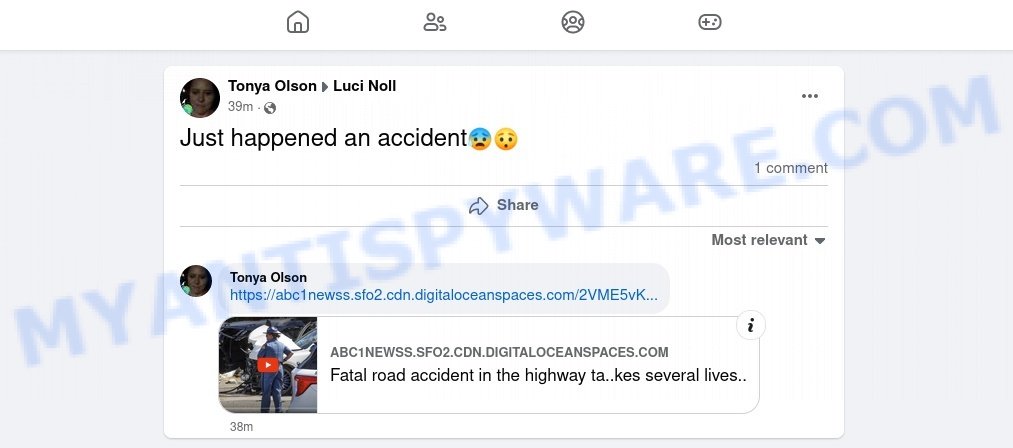⚠️ Have you seen a Facebook post saying “I can’t believe He’s gone I’ll miss him so much” with a link to a supposed news story? Beware, this could be the “Can’t Believe He’s Gone” scam aiming to mislead you into visiting harmful websites.
Here’s the scenario: The scam post, appearing to come from someone you know, shares a message of loss or shock, such as “I can’t believe he’s gone. It happened so suddenly.” It includes a link with a headline like “BBCNEWS Fatal Road Accident In The Highway Takes Several Lives”, which seems legitimate. However, this link actually leads to a fraudulent site designed to compromise your personal information or infect your device with malware.

The “I can’t believe He’s gone” Facebook Post, with its emotionally charged content and fake news headline, is a phishing scam. Despite appearing credible, it’s a ruse to ensnare you. ❗ Remember, real news is confirmed through official and trustworthy channels, not through sensational social media posts. Be cautious of clicking on links from unexpected sources and keep your digital security measures up to date. Staying aware of these scams is crucial to protect your online safety.
Table of Contents
🚨 Is the “Can’t Believe He’s Gone” Facebook Post a Scam?
Yes, the “I can’t believe He’s gone” posts with sensational news headlines on Facebook are a Scam! 🚫. If you’ve come across a Facebook post from a friend that seems to be grieving a sudden loss with a link to a news story, exercise extreme caution. These posts are not sharing genuine news but are crafted to exploit emotions and curiosity.

Fake posts examples:
- I can’t believe he’s gone. I’ll miss him so much😭😭😭 [Link to an external website]
- I can’t believe you’re gone. I’m going to miss you R.I.P.😭😭 [Link to an external website]
- I can’t believe he is gone. I’m gonna miss him so much 😭😭😭 [Link to an external website]
- I can’t believe she’s gone, she was so young 😭😭 [Link to an external website]
- I can’t believe they’re gone, this is horrible 😭😭 [Link to an external website]
- I can’t believe she’s gone, it was too soon 😭😭 [Link to an external website]
The fraudulent links in these posts lead users to fake posts designed to mimic legitimate news sources or other credible sites. 🚨 The objective? To lure you into providing personal information or downloading malware. These sites might steal login details, personal data, or even trick users into subscribing to unwanted services. Remember: legitimate news is usually verified and reported through well-known news channels and not exclusively via social media posts. Stay alert and always cross-check news through reliable sources before engaging with such content. 🛡️

Fake news examples:
- BBCNEWS Fatal Road Accident In The Highway Takes Several Lives
- He died on an accident😰 Fatal Road Accident In The Highway
- Deadly pile-up on the highway leaves multiple dead, dozens injured
- Just happened an accident😰😰 Fatal Road Accident In The Highway Takes Several Lives
- Horrible tragedy at the amusement park claims several young lives
- Breaking news – fatal boat sinking in the Caribbean
- Omg! I cannot believe this fatal accident. At least 10 lifeless bodies recovered on temple trip bus
🚩 Red Flags to Watch Out For:
Be cautious and verify the authenticity of such posts through official news sources if you encounter these warning signs. 🔍🛡️
- 📧 Emotionally Charged Messages: Posts starting with phrases like “I can’t believe he’s gone” that play on emotions are a common tactic in these scams.
- 🔗 Suspicious Links: The post includes a link to an external website, often mimicking a news domain. Always scrutinize the link’s destination before clicking.
- ⏳ Sensational Headlines: The use of urgent and sensational news headlines, such as “Breaking news – fatal accident”, aims to provoke immediate curiosity and concern.
- 🖼️ Video Thumbnails: Be wary of posts with video thumbnails that suggest a link to a news video, which is actually a façade for malicious websites.
- ✍️ Language and Tone: These posts may contain emotional or sensational language to grab attention. They often lack the depth and balance of genuine news reporting.
- 👤 Use of Familiar Contacts: The scam often appears to be shared by someone you know, adding a false sense of legitimacy and trust.
- 🔄 Redirects to External Sites: Legitimate news stories are usually hosted on official news websites, not through external links in social media posts. Be cautious of any post that redirects you away from Facebook.
🕵️♂️ How the “Can’t Believe He’s Gone” Facebook Scam Works
The “Can’t Believe He’s Gone” Facebook scam is a cunning form of social engineering that manipulates users’ emotions and trust. Understanding its mechanics is crucial to protect yourself from falling victim to this deceptive tactic. 💡🔐
🚨 Emotional Manipulation
The scam starts with a Facebook post that seems to come from someone you know, expressing grief over a sudden loss. The post typically says something like, “I can’t believe they’re gone” and includes a sensational news headline. This emotional setup is designed to evoke sympathy and curiosity, leading users to click on a provided link without questioning its authenticity.

🔗 Deceptive Links
These scam posts cleverly include links that appear to lead to news stories but are actually fraudulent. The links often mimic authentic news or video sites, tricking users into thinking they’re clicking on legitimate content. The primary aim? To redirect users to counterfeit websites where the scam unfolds. It’s important to remember that genuine news is typically found on well-known and established news platforms, not through obscure links in social media posts.

Deceptive Links Examples:
- https://www.facebook.com/bbcnewssusa01/posts/…
- https://www.facebook.com/events/37…
🎭 False News Presentation
Once clicked, the link takes users to a site that presents what appears to be a news video or article related to the shocking headline. However, these are fake setups intended to further convince the user of the post’s legitimacy, encouraging them to interact further, typically by entering personal information or downloading malicious content.

📥 Phishing and Malware Risks
Interacting with these fraudulent sites can lead to various risks, such as phishing attempts to capture login credentials or malware installations. Users might be prompted to enter personal details or download files, which can compromise their online security and privacy.
📋 Data Harvesting and More Scams
The scam may involve more than just stealing login details. It can lead users through various deceptive steps, such as fake surveys or offers, to collect additional personal information for different forms of fraud or identity theft.
🔄 Illusion of Authenticity
The scam often maintains its deception throughout the interaction, providing users with false reassurances that they are accessing legitimate information or helping a friend. This tactic keeps the user engaged and less likely to question the legitimacy of the content, further exposing them to risks.
📢 Help Us Combat Scams: Report Your Experience!
If you’ve encountered the “Can’t Believe He’s Gone” Facebook scam, we strongly encourage you to share your experience in the comments. Please include any details like the exact phrases used in the posts, the nature of the headlines, or the links to the scam websites. By sharing your story, you contribute to raising awareness about this scam, helping us track its prevalence, and potentially disrupt its deceptive operations. Your insights are crucial in our collective effort to combat online fraud. Together, we can keep our online community informed and safeguard against such emotional manipulation scams! 🛡️💬
What to Do If You Encounter the “Can’t Believe He’s Gone” Facebook Scam
If you come across the “Can’t Believe He’s Gone” scam on Facebook, it’s crucial to act wisely to protect yourself and your network. This emotionally manipulative scam can be disconcerting, but being informed and proactive is your best defense. Here’s a guide on how to handle this situation effectively.
🚫🔗 Don’t Click Any Links
If you see a post or receive a message with the typical “I can’t believe they’re gone” format and a sensational news link, do not click it. These links are the primary method scammers use to direct you to malicious websites.
🔐 Secure Your Account
As a precaution, consider changing your Facebook and related account passwords, especially if you have interacted with such a post. This helps ensure your account’s security.
📞 Verify News through Reliable Sources
Before believing or sharing such news, verify it through official news channels or directly from news websites. Do not rely on social media posts for critical news updates.
🚨 Report the Scam
Report the post to Facebook by using the report feature available on every post and message. This helps Facebook identify and take action against such scams.
👥 Inform Your Contacts
If you’re aware of friends or family who might be susceptible to such scams, inform them about this deceptive tactic. Raising awareness is key to preventing the spread.
🔒 Use Security Features
Enable features like two-factor authentication on your Facebook account. This adds an additional security layer, making it more difficult for scammers to gain unauthorized access.
📰 Stay Informed
Keep yourself updated about common online scams and phishing tactics. Following cybersecurity news and updates can help you stay one step ahead of potential threats.
📌 How to Report the “Can’t Believe He’s Gone” Scam on Facebook?
If you see the “I Can’t Believe He’s Gone” scam on Facebook, it’s important to report it. Doing this helps keep you safe and also protects others on Facebook from these tricks. Here’s how you can report this scam to Facebook step by step:
🔍 Find the Suspicious Post
Go to the post that looks like the scam.
👉 Click the Three Dots
Look for the three dots (⋮) at the top right of the post.
🚩 Choose to Report
Select “Report post” or “Find support or report post” from the menu.
❓ Select the Reason
Pick a reason for reporting, such as “It’s a scam” or “False information”.
✔️ Complete the Process
Follow any additional steps on the screen to finish reporting.
Summary Table
| Name | “Can’t Believe He’s Gone” Facebook Post Scam, Fake Tragic News Sharing |
| Type | Social Engineering, Emotional Manipulation Scam |
| Damage | Potential exposure to phishing sites, risk of personal data theft, possibility of malware infection, emotional distress |
| Distribution | Facebook posts and shares, often appearing on news feeds or shared by friends |
| Tactics | Use of emotionally charged language, fake news headlines, impersonation of legitimate news sources, deceptive links leading to malicious sites |
| Scammers’ Websites | Fraudulent websites mimicking news platforms or video content, URLs often resembling legitimate news domains but leading to phishing or malware sites, examples: video-start-facebook-2024.sfo3.cdn.digitaloceanspaces.com, abc1newss.sfo2.cdn.digitaloceanspaces.com |
| Prevention Tips | Verify news stories through official news sources, avoid clicking on sensational links, educate friends and family about this scam, use updated antivirus software, be skeptical of emotionally manipulative posts. |
| Reporting Info | Report scam posts using Facebook’s reporting feature on the post, stay informed about current scam trends to recognize similar tactics in the future |
😱 Steps to Take If You’ve Been Tricked by the “Can’t Believe He’s Gone” Facebook Scam
Realizing you’ve fallen for the “Can’t Believe He’s Gone” Facebook scam can be distressing. This scam exploits your trust by using emotionally manipulative posts to lure you into clicking malicious links. If you suspect you’ve interacted with one of these scam posts, stay calm. Here’s a straightforward list of actions you can take to mitigate the situation.

🔐 Immediate Password Change
Immediately change your Facebook password. If you use the same or similar passwords for other accounts, change those as well to prevent further security risks.
👀 Monitor Account Activity
Closely monitor your Facebook account for any unusual activities. Scammers might use your account information to impersonate you or misuse your account.
📞 Contact Facebook Support
Get in touch with Facebook’s official support. Inform them about the scam and any actions you may have taken after interacting with the post. They can offer specific advice to secure your account.
🔒 Enable Two-Factor Authentication
Activate two-factor authentication for your Facebook account. This adds an extra layer of security, safeguarding your account even if scammers have your password.
🚫🔗 Inform Your Friends and Network
Warn your friends, family, and network about the scam. Advise them to be cautious of similar posts and not to trust unexpected messages or links, especially if they appear to be from your account.
📝 Document the Scam
Record evidence of the scam, such as screenshots of the post and any interactions you had. This documentation can be useful if you need to report the incident or for future
reference in case of any disputes or investigations.
👮♀️ Report to Local Cybersecurity Authorities
Consider reporting the incident to local cybersecurity or law enforcement authorities. While online scams are common, reporting them can contribute to broader efforts to combat such malicious activities.
📘 Stay Informed and Educated
Regularly update yourself on the latest online scams, including variations of the “Can’t Believe He’s Gone” scam. Staying informed helps you recognize and avoid falling victim to similar tactics in the future.
🎯 Conclusion
The “Can’t Believe He’s Gone” Facebook scam is a sophisticated form of emotional manipulation used by cybercriminals. It preys on the natural human response to shocking or sad news, using fake posts about tragic events to lure users into clicking on harmful links. The main goal of this scam is to redirect users to fraudulent websites, which can lead to the theft of personal information, exposure to malware, and potential financial loss.
It’s crucial to understand that real news stories are typically reported through established news channels, not via sensational social media posts with dubious links. The best defense against such scams is a combination of awareness, skepticism, and caution. Always verify the authenticity of emotionally charged posts, avoid clicking on suspicious links, and educate your network about these deceptive tactics. Regularly updating your security measures, such as changing passwords and using two-factor authentication, can also help protect your online presence. 🛡️🌐
















